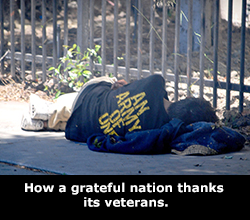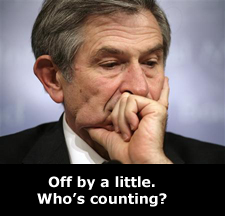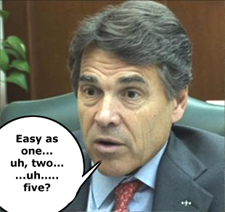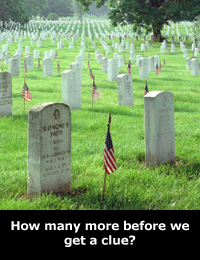Two events in the news this week struck many – including me – as both depressing and unsurprising. One was the sickening mass killing in California by a depraved disciple of the so-called “men’s rights movement”, something that seems most vibrantly to inhabit the netherworlds of the net. The other is the ever-ballooning VA debacle, fueled by almost daily revelations about other service members and veterans being denied care to the point of death.
No need to explain the depressing element of either of these – the facts are plain and, well, devastating. I will dwell a bit on the unsurprising aspect of the events because it angers me, and as the late Maya Angelou instructed us, anger can be a positive force, so long as it doesn’t lead to bitterness. She has a point there. Would that someone had impressed this upon the young shooter in Isla Vista some years back.
 The shooting cannot surprise us, any more than extreme weather can in the wake of Sandy and Katrina. We go through this process every few weeks. We see the head shaking, the somber tones of voice, the promises to do more … and then we’re back at the beginning again. In America, each day is a new beginning; yesterday is forgotten with the next sunrise. Some see this as our promise as a nation, but it’s more of a curse. We keep tripping over the same fold in the carpet, again and again. Somehow, we are helpless.
The shooting cannot surprise us, any more than extreme weather can in the wake of Sandy and Katrina. We go through this process every few weeks. We see the head shaking, the somber tones of voice, the promises to do more … and then we’re back at the beginning again. In America, each day is a new beginning; yesterday is forgotten with the next sunrise. Some see this as our promise as a nation, but it’s more of a curse. We keep tripping over the same fold in the carpet, again and again. Somehow, we are helpless.
The same can be said of the VA scandal. This dysfunction is something that pops up over and over again in our history, particularly as wars wind down and soldiers return home in pieces, both physically and mentally. We did not prepare for exponential growth in the population the VA serves, even though we knew it was coming. This was a slow-motion train wreck, and it proves that for all of our magnetic yellow ribbons, all of our bleats of “thank you for your service”, we are still just as dismissive of our veterans as we have been in previous conflicts.
The impetus to address these problems must come from ourselves. These are our failings: we need to address them.
luv u,
jp

 Yeah, not so much. But it did sound good at the time, didn’t it? And now, many deaths, dismemberments, and billions of dollars later, we are faced with an enormous backlog of wounded and battle-stressed soldiers, attempting to access a VA system that does not have the physical infrastructure to serve them in a timely fashion. That’s a large part of what’s behind the deceptive practices we are hearing about now – people trying to feign success when the system is failing miserably, at least on the intake end.
Yeah, not so much. But it did sound good at the time, didn’t it? And now, many deaths, dismemberments, and billions of dollars later, we are faced with an enormous backlog of wounded and battle-stressed soldiers, attempting to access a VA system that does not have the physical infrastructure to serve them in a timely fashion. That’s a large part of what’s behind the deceptive practices we are hearing about now – people trying to feign success when the system is failing miserably, at least on the intake end. Primary numbers. Cousin Rick Perry seems to have a lot of trouble with ordinal lists, even with Ron Paul trying to throw him a bone. (Note to Rick: when someone gives you an easy out, take it.) He somehow managed to draw attention away from Herman Cain’s various troubles for a large portion of a news cycle, and not in a good way. Given cousin Perry’s seemingly drunken performance in New Hampshire last week and his puzzling lapse this week, one has to wonder if he really wants that Washington job. Cain, on the other hand, seems to want it badly enough to hire legal counsel to threaten women with litigation if any one of them dares step forward with yet another allegation against the pizza king. Now that’s the kind of message we want to send women, right? Spoken like a true CEO.
Primary numbers. Cousin Rick Perry seems to have a lot of trouble with ordinal lists, even with Ron Paul trying to throw him a bone. (Note to Rick: when someone gives you an easy out, take it.) He somehow managed to draw attention away from Herman Cain’s various troubles for a large portion of a news cycle, and not in a good way. Given cousin Perry’s seemingly drunken performance in New Hampshire last week and his puzzling lapse this week, one has to wonder if he really wants that Washington job. Cain, on the other hand, seems to want it badly enough to hire legal counsel to threaten women with litigation if any one of them dares step forward with yet another allegation against the pizza king. Now that’s the kind of message we want to send women, right? Spoken like a true CEO. Such obfuscation is more effective with today’s all-volunteer military, but back when the draft was running at full steam, it was a much harder sell. When you are literally forcing people to go to war, your praise tends to ring a bit hollow. Of course, our volunteer military is forced, technically speaking – they have no choice but to go, even if they merely joined up for the promise of college tuition. But unlike the 60s and prior, this is not a broadly-experienced phenomenon. Back then, masses of young people were threatened with deployment and particularly in the case of Vietnam, many were sent against their will. In that circumstance, there’s a strong incentive to examine the policy very closely. Many did, and didn’t like what they found.
Such obfuscation is more effective with today’s all-volunteer military, but back when the draft was running at full steam, it was a much harder sell. When you are literally forcing people to go to war, your praise tends to ring a bit hollow. Of course, our volunteer military is forced, technically speaking – they have no choice but to go, even if they merely joined up for the promise of college tuition. But unlike the 60s and prior, this is not a broadly-experienced phenomenon. Back then, masses of young people were threatened with deployment and particularly in the case of Vietnam, many were sent against their will. In that circumstance, there’s a strong incentive to examine the policy very closely. Many did, and didn’t like what they found.